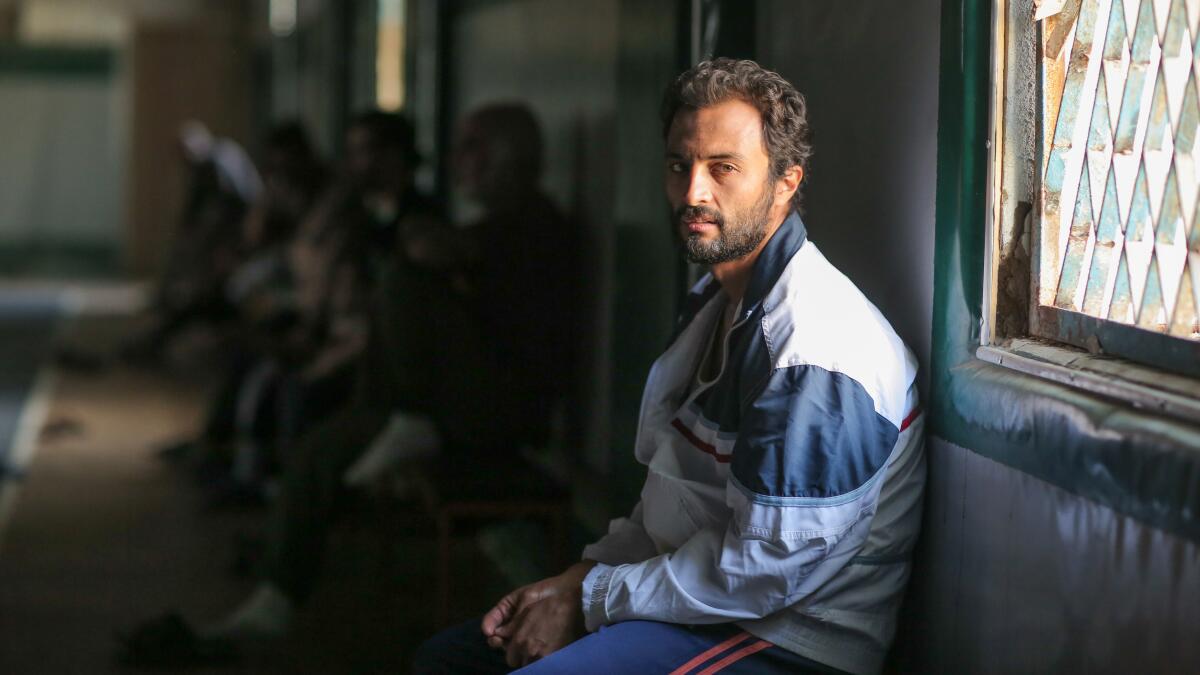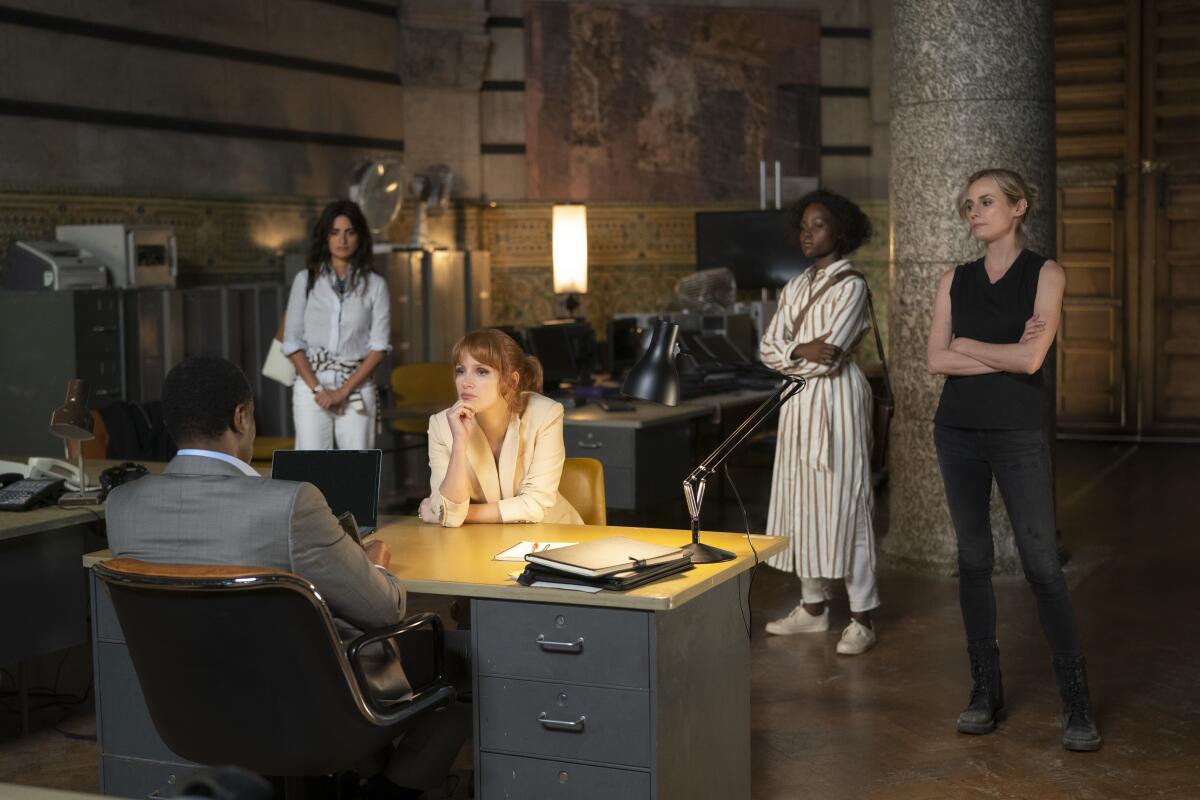Asghar Farhadi triumphs again with ‘A Hero’
Hello! I’m Mark Olsen. Welcome to another edition of your regular field guide to a world of Only Good Movies.
Only good movies
Get the Indie Focus newsletter, Mark Olsen's weekly guide to the world of cinema.
You may occasionally receive promotional content from the Los Angeles Times.
As we were finishing this week’s newsletter, news broke that actor, filmmaker and activist Sidney Poitier had died at age 94. The first Black man to win a competitive Oscar for best actor, it is hard to capture how Poitier transformed Hollywood with performances in films such as “The Defiant Ones,” “Lilies of the Field,” “A Raisin in the Sun,” “Guess Who’s Coming to Dinner,” “To Sir, With Love” and “In the Heat of the Night.”
As actor James Earl Jones once said, “When he became a star, everyone, white and Black, said, ‘I like this man.’”
Filmmaker Peter Bogdanovich also died this week, at age 82. In an appreciation of his long career, which included the astonishing early run of “Targets,” “The Last Picture Show,” “What’s Up, Doc?” and “Paper Moon,” along with “At Long Last Love,” “Saint Jack,” “They All Laughed” and many more, I wrote that he was “always slightly out of step with his times. Given to a nostalgist’s over-indexing of the past, he nevertheless pressed on into the future, beginning his career with a then-unfashionable sympathy to those who came before and ending up with a whimsical air of delight to still be at it.
“His complicated career is often depicted as a cautionary tale of ego and success destroying one’s artistic integrity, and it is undeniable he made massive mistakes in his life and work. Frequently his own biggest obstacle, he also had a singular vision to fuse what once was with what could be.”
In other news, the Sundance Film Festival canceled plans for in-person events in its longtime home of Utah later this month, shifting to a largely virtual event. The news came as a string of entertainment events, including the Grammy Awards, the Palm Springs International Film Festival, the Critics Choice Awards and the academy’s Governors Awards, were canceled or postponed because of the fast-moving Omicron variant.
For the directors segment of our Envelope Oscar Roundtable, I moderated a conversation among Kenneth Branagh for “Belfast,” Reinaldo Marcus Green for “King Richard,” Maggie Gyllenhaal for “The Lost Daughter,” Siân Heder for “CODA,” Adam McKay for “Don’t Look Up” and Lin-Manuel Miranda for “Tick, Tick … Boom!” Gyllenhaal spoke about the tone of her film, which plays like a thriller even as it explores the inner life of a woman who has rejected her role as a mother.
“One thing I had really clear was the tone. I had some idea of how I wanted to start, tone-wise. I knew I wanted to kind of play with a classic thriller format and then explode it,” Gyllenhaal said.
“And I think it does have something to do with being a woman,” she said. “I know not everyone agrees with me on this, but I think women make movies that are different than men. And for a long time we saw movies, we learned a language, that was made by men — fantastic movies, moving movies. But I guess I was curious what my language would be if I let it out. But I wanted to start with a kind of language I already knew.”
When the film “Swan Song,” which we featured last week, had its world premiere last fall at AFI Fest, I moderated a Q&A after the screening with star and producer Mahershala Ali and writer-director Benjamin Cleary. The conversation is a bonus episode of The Envelope podcast this week. The movie marks Ali’s first lead role in a feature film, but it certainly won’t be his last, as he is soon to play the superhero Blade.
Speaking on what it means to him to be taking up such an iconic role, Ali said, “Every part is iconic. I don’t look at them any different. I have the same responsibility 100% of the time. Whether I’m a lead or in one scene, if I’m doing voice-over acting, if I’m doing a commercial, I just am how I am with the work. I’m picky. I get on my own nerves. So it’s all important to me. I would be wrong to say that I don’t feel more pressure, but I always feel pressure, and I feel like something’s wrong if I don’t feel pressure to some degree. It’s how I understand how to move through the world at this point. There’s probably a healthier, more productive way of doing it, and maybe I will discover that.”
Enjoying this newsletter? Consider subscribing to the Los Angeles Times
Your support helps us deliver the news that matters most. Become a subscriber.
‘A Hero’
Written and directed by two-time Oscar winner Asghar Farhadi, “A Hero” is Iran’s submission for the international feature Academy Award. In the film, Rahim (a powerful Amir Jadidi) is on leave from debtors prison when he returns a bag of gold coins to an elderly woman. Although at first it seems the attention from this act will relieve his problems, it only swells to create deeper complications. The film is in theaters and begins streaming on Amazon Prime Video on Jan. 21.
For The Times, Justin Chang wrote, “A rigorous pessimist who nonetheless avoids the trap of easy cynicism, Farhadi understands and, up to a point, satisfies the public’s need for everyday uplift. ‘Human-interest stories’ may be a reductive term for his particular mode of character-rich, milieu-specific filmmaking, but it is not an entirely inaccurate one. … One of Farhadi’s shrewder insights here is that institutions, perhaps even more than individuals, have a real stake in turning inspirational stories to their financial and reputational advantage. He has always been good at revealing interlocking chains of complicity — at using, say, a couple’s looming divorce in ‘A Separation’ to confront tough, intractable issues of class, money, religion and gender in present-day Tehran. While it’s more studied than that earlier film and doesn’t achieve the same gut impact, ‘A Hero’ undertakes a similar process of social illumination.”
For the New York Times, A.O. Scott wrote that Farhadi “makes films with the discipline and insight of a first-rate novelist. ‘A Hero’ is as anxious and swift as a thriller, with the density and observational acuity of a 19th-century three-decker. … By the time the narrative reaches its (bittersweet, satisfying) conclusion, you may decide that the narrative wasn’t really the point. Early in the film, Rahim visits [his brother-in-law] at his workplace, an ancient necropolis carved into the side of a cliff. It’s covered in scaffolding, which is something of a metaphor for the plot of this ingenious and engrossing movie — a series of ladders and passageways that both cover and grant access to mysteries of life and death.”
For the Hollywood Reporter, Deborah Young wrote, “Perhaps owing to his work in theater, writer-director Asghar Farhadi seems able to find drama in the most surprising places. … A far cry from the director’s middle-class drama ‘A Separation,’ the first Iranian film to win the Academy Award for best foreign language film, ‘A Hero’ returns Farhadi to the basics of national storytelling in an increasingly complex tale of half-truths and lies that eat away at all those who traffic in them, which is to say, everybody.”
For RogerEbert.com, Glenn Kenny wrote, “Farhadi shoots and cuts his story with his usual admirable dispatch, never erring in his camera placement or staging. That said, his script is hardly as seamless as it aspires to be. I frequently got the sense that Farhadi wrote the story’s varied poor outcomes for Rahim first, then retconned the traps that he almost habitually steps into, to reach the not-quite-resolution that’s a hallmark of Farhadi’s work. But as an arraignment of the systems that ultimately rule human interaction regardless of the superficial societal differences between Europe, the Americas, and the East, ‘A Hero’ is a chilling demonstration of how, as the song says, money changes everything.”

‘The 355’
Directed and co-written by Simon Kinberg, “The 355” brings together actors Jessica Chastain, Diane Kruger, Penélope Cruz, Bingbing Fan and Lupita Nyong’o as international intelligence agents who join forces to track down a piece of technology that threatens the safety of the world. The movie is playing in theaters in general release.
I reviewed the film for The Times, writing, “The storytelling and plotting feel pulled together from spare parts of recent ‘Mission: Impossible’ and James Bond films, with a disavowal here and some light parkour there and multiple destabilizing double-crosses. The high-gloss sheen and glamour of those movies, with their spectacular international locales and operatic action, prove harder to replicate here. … Simply having women star in a sluggish iteration of an airport dad-novel espionage-action story is not inspiring on its own. Despite a few scattered moments, the team-up action of ‘The 355’ never fully comes together.”
For the New York Times, Amy Nicholson wrote, “There’s a sense that ‘The 355’ felt forced to pick between being sincere or being fun. It chose solemnity. As a result, it’s flat-footed even when the setups yearn to be playful. Viewers are not invited to giggle when a pursuit detours into a men-only bathhouse, or at a surreal moment in an undercover sequence when Chastain rips off her red wig disguise to reveal … her own identical red hair. The drums thunder as though they’re dead-serious about proving that women can make an expensive adventure that’s every bit as banal as the ones that boys crank out every month with basically the same plot.”
For Empire, Helen O’Hara wrote, “Producer and star Jessica Chastain and director Simon Kinberg team up here to give the world a charismatic, female-centric team of super-spies to balance all those male-led spy thrillers. You just wish the story had been as innovative as the casting, and the twists less screamingly obvious to even those without secret-agent training. … It’s all fun and games until, in its last moments, this film succumbs to the increasingly common disease of sequelitis, with a coda so determined to launch a franchise that it fails to be fully satisfying now. These women are effective and fierce; leave it to audiences to decide whether we want them on another impossible mission.”
For Film Freak Central, Walter Chaw wrote, “The idea to do a female-centric version of ‘Mission: Impossible’ named after the alias of George Washington’s female spy originated with co-star Jessica Chastain, who revealed on the endless junket for ‘The 355’ that she had neither a script nor a story in mind while putting the package together. I’m not certain that condition was ever fully addressed prior to the production’s funding, casting, shooting, editing, or release. … The new ‘Spider-Man’ movie will be blamed for this film going up in flames (that and misogyny), but ‘The 355’ deserves the dignity of imploding under the weight of its own considerable and mortal miscalculations.”

Only good movies
Get the Indie Focus newsletter, Mark Olsen's weekly guide to the world of cinema.
You may occasionally receive promotional content from the Los Angeles Times.




